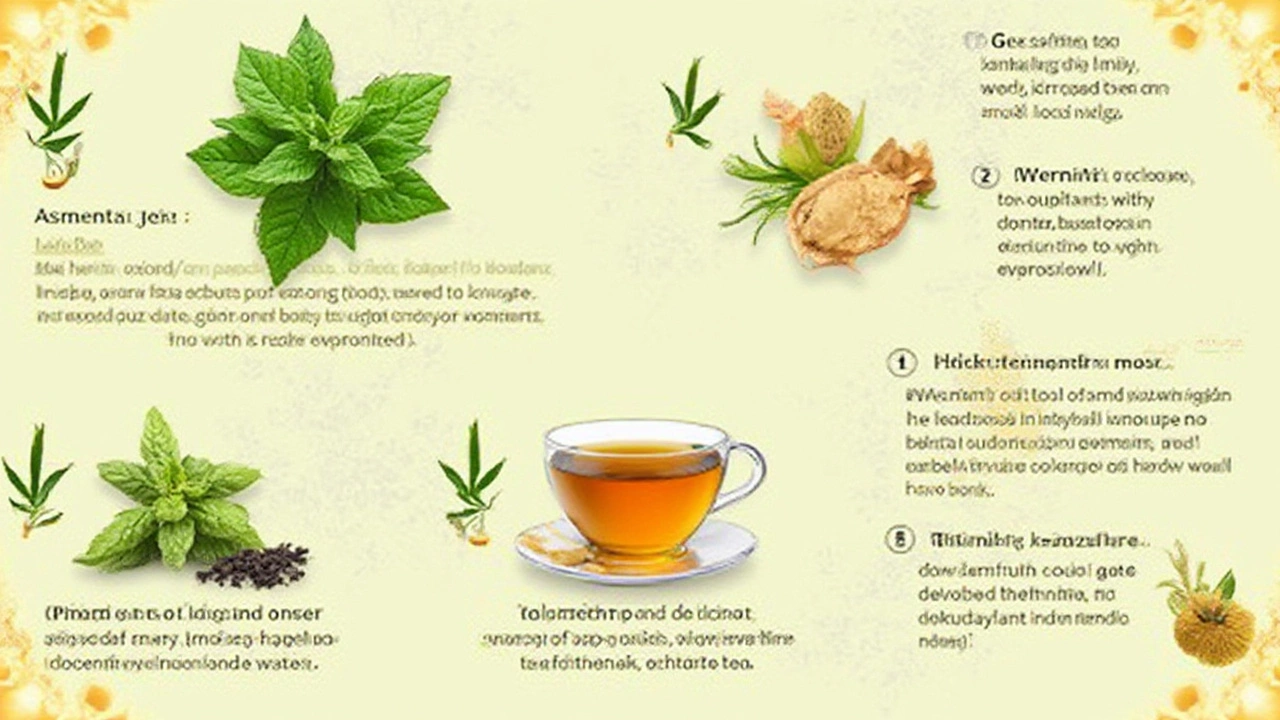Ever popped a herbal supplement thinking it would chill you out, only to find your heart racing and your mind all over the place? Yeah, it's a wild ride when what you hoped would help your nerves actually gives them a jumpstart. People forget that herbs aren't magically safe just because they grow from the ground. Some of them, when used without care or research, can flip your mood and send your anxiety soaring. You’d be surprised how often this happens—there’s a funny disconnect between the healthy-green image of herbs and the real, sometimes crazy way they act in our bodies.
Why Do Some Herbs Cause Anxiety?
Let’s call it what it is: we’ve romanticized herbs for centuries. Chamomile for sleep, ginseng for energy, valerian for relaxation. But just like standard meds, herbs interact with brain chemistry. Sometimes they stimulate neurotransmitters a bit too much. For example, herbs that ramp up dopamine or norepinephrine activity may cause symptoms like jitteriness, racing thoughts, and even panic attacks. Remember, our bodies all have unique wiring, so your friend might find green tea calming, but for you, that same drink could spike your adrenaline.
Certain herbs act as stimulants, especially those containing natural caffeine or similar compounds, like guarana or yerba mate. Even a common kitchen favorite, rosemary, can increase energy or alertness, acting a bit like a double espresso shot for some people. But the real catch is, a lot of folks mix herbs or take mega-doses thinking 'more is better.' That’s where things get weird: synergy between herbs can exaggerate effects.
It's also important to consider what else you're taking. If you grab a herbal tea that has licorice root (which can raise blood pressure and cause headaches), and you’re already on a medication for anxiety, that interaction can get messy—fast. Plus, some herbs come with hidden variables, like contaminants, mislabeling, or unpredictable potencies. One study from 2022 found that nearly 40% of herbal supplements tested in the US had different actual ingredients than the label claimed. Shocking, right? So yeah, knowing which herbs might actually make your anxiety worse is worth your time.
Top Herbs That Can Spike Anxiety
So, which herbs are the sneaky culprits behind increased anxiety? Let’s break down the big offenders, and how they actually affect our minds and bodies. Some of these will surprise you.
- Caffeine-Containing Herbs: Think guarana, kola nut, yerba mate, and green tea. Their natural caffeine content works just like a strong cup of coffee. If you’re sensitive, boom: palpitations, sweaty palms, and that “wired but tired” feeling.
- Ginseng: While ginseng is famous for energy, studies flag it for possible irritability, insomnia, and nervousness—especially in people who already have anxiety. Korean ginseng is especially potent.
- Yohimbe: Sourced from the West African yohimbe tree, it’s promoted for testosterone and weight loss, but it often results in panic attacks, racing heart, and spikes in blood pressure. The FDA has actually warned against over-the-counter yohimbe supplements for this reason.
- Ephedra (Ma Huang): Now banned in the US, this ancient Chinese herb drove people’s anxiety and heart rates off the charts. Even a small amount was a recipe for disaster if you’re anxious by default.
- Licorice Root: This one confuses people. It tastes sweet, but high doses lift cortisol (your stress hormone) and may amplify anxiety and headaches.
- Thyme and Rosemary: Yes, your kitchen herbs. Big doses, or super-concentrated oils, can sometimes make people feel revved up and edgy. The usual sprinkle on pizza won’t do it, but herbal extracts or teas might.
- St. John’s Wort: It’s used for mood, but in some people, especially if you’re already taking SSRIs, it can cause jitters, restlessness, and a racing heart.
- Ginkgo Biloba: Supposed to help memory, but in high doses, it can produce headaches, nervousness, and quickened pulse.
Ever tried a new supplement and Simba, your dog, wouldn’t leave your side all day? Might be your nervous energy is rubbing off. Your best bet is to track how you feel after trying anything new—herbal or not.

Scientific Insights About Herbs and Anxiety
Most of the info we get about herbs comes from old remedies, internet listicles, or advice from a ‘friend of a friend.’ But actual science paints a fascinating, messy picture. Take caffeine-containing herbs, for example—there’s research from 2023 that found people who have a genetic variation in the CYP1A2 gene clear caffeine from the body way slower. For them, two cups of green tea (or a high-dose herbal supplement) can mean hours of heart palpitations, irritability, and insomnia. Not great news if anxiety is already in the mix.
Then there’s St. John’s Wort, probably the best-studied herbal remedy for mood. Turns out, its active compounds (hypericin and hyperforin) ramp up serotonin, dopamine, and norepinephrine. That might sound helpful, but if you already have too much of those neurotransmitters, or you’re combining the herb with medications like Prozac or Zoloft, the result can be serotonin syndrome—a dangerous, chaotic mess of anxiety, restlessness, tremors, and heart palpitations.
One cool but scary fact: the FDA’s Center for Drug Evaluation and Research found that of all herbal reports they reviewed in 2024, incidents of anxiety and restlessness most commonly traced back to products with undisclosed caffeine, synephrine (another stimulant), or potent ginseng.
The kicker? Many herbal extracts are mega-concentrated. You’re not getting what a medieval monk would have brewed in his teapot; it’s more like a punch to your nervous system from a firehose. Even rosemary and thyme, in the form of essential oils or high-dose tinctures, can push the nervous system to overdrive. One case study from a British hospital in 2023 linked a spike in panic attacks to a rosemary essential oil diffuser at a yoga studio. Wild, but it makes sense when you dig into the biochemistry.
Here’s a snapshot of what research says about some of these herbs:
| Herb | Main Compound | Reported Effects (High Dose) | Research Notes |
|---|---|---|---|
| Guarana | Caffeine | Anxiety, insomnia, irritability | 2019, University of São Paulo, Brazil: Linked to sleeplessness & elevated heart rate in 35% of users |
| Korean Ginseng | Ginsenosides | Agitation, nervousness | 2021, JAMA Psychiatry: 1 in 5 reported anxiety symptoms |
| Yohimbe | Yohimbine | Panic attacks, palpitations | 2022, FDA: Warnings issued for OTC products |
| Licorice Root | Glycyrrhizin | Increased cortisol, anxiety | 2020, Nutrition Reviews: Advised caution in anxious patients |
| Rosemary | Rosmarinic Acid | Jitteriness (rare) | 2023, Hospital case study: Panic attacks linked to diffuser use |
Who Is Most at Risk from Anxiety-Inducing Herbs?
The thing about herbs is, some people get walloped, while others barely notice a thing. Genes, body weight, metabolism, and the state of your nervous system play huge roles. If you already deal with anxiety or panic attacks, your odds of a negative reaction go way up. The same goes for folks who have a ‘sensitive’ central nervous system—maybe you feel everything intensely, quickly react to coffee, or lose sleep from a late-night cola. That’s your cue to go slow with herbal stuff.
- Women may react more to some herbs, especially during hormonal swings. Estrogen can mess with how your body processes ginseng, for example.
- Teenagers are especially sensitive, since developing brains and bodies don’t always handle strong stimulants well.
- Anyone on prescription meds for anxiety, depression, ADD, or heart conditions is at higher risk for cross-reactions or amplified side effects.
- People with thyroid issues should be careful, since herbs like ginseng or licorice can throw thyroid hormones out of balance.
- If your sleep’s a mess already, herbs that act as stimulants will just make things worse. Even camomile can have a paradoxical effect in rare cases due to allergies or sensitivities.
I learned this the hard way: tried a popular “focus blend” tea before a big writing sprint, and instead of knocking out a killer article, I ended up pacing my office, sweating bullets, while Simba looked at me with the saddest 'What is wrong with you, bro?' face. Lesson learned: double-check every label, and never assume a pretty box means safe for everyone.

How to Stay Safe with Herbal Remedies
So you don’t have to ban herbs from your life—just treat them with healthy respect. The first move? Research before you buy. If the label’s full of mystery ingredients or unpronounceable chemicals, skip it. Go for brands with third-party testing or certifications. Apps like Labdoor or ConsumerLab can help you spot fakes, scams, or contaminated products.
- Start Low, Go Slow: If you want to try something new, use the smallest dose. Give it at least 48 hours before bumping it up. Watch for weird symptoms—heart flutters, cold sweats, or a brain that won't shut off.
- Track Your Response: Keep a notebook, use your phone’s notes, or even a spreadsheet. Write down every new herb you try, the dose, time of day, and any changes in mood or body.
- Ask a Professional: Natural doesn’t always mean safe. Pharmacists, naturopaths, and even some MDs are cool with talking supplements now. It’s worth the 10-minute chat, especially if you’re taking meds.
- Check for Interactions: Apps like Medisafe or Drugs.com Interaction Checker let you type in everything you’re taking—herbs included—and flag dangerous interactions.
- Be Honest About Your History: If you’ve had panic attacks or a rough patch with anxiety before, stay on the cautious side. Your nervous system will thank you.
Here’s another practical tip: always keep a bottle of water handy and avoid combining multiple 'energetic' herbs. If an herbal tea sends you spinning, stop right away, and consider switching to a single-ingredient formula instead. Your sleep quality, mood, and even your day with your golden retriever could improve dramatically.
If something feels off after starting a new herbal product—listen to your body. There’s no gold medal for sticking with a supplement that makes you feel worse. Trust your instincts, watch for patterns, and keep it simple whenever possible.
